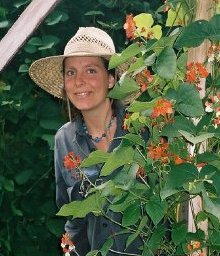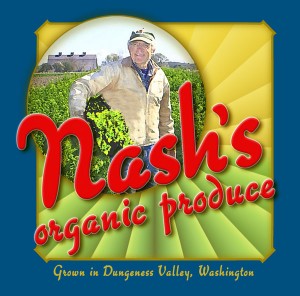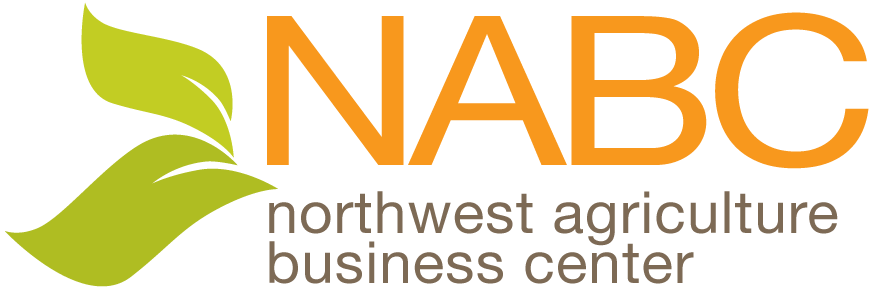Producer Member Highlight – Kia Armstrong, Nash’s Organic Produce
New PSFN member, Nash’s Organic Produce, has been farming in the Dungeness River Valley for nearly four decades. Farm to Community Coordinator, Emma Brewster, chatted with Nash’s Farm Manager, Kia Armstrong last week about the farm’s history, its current projects, and how the farm is planning for its next generation of managers and the future.
 Tell us about Nash’s, how you came to the farm and what your role is.
Tell us about Nash’s, how you came to the farm and what your role is.
Nash’s has been farming in the Dungeness River Valley for over thirty five years. The farm has grown considerably in the last decade and today we manage almost 400 acres. Nash and his wife Patty own ten acres, and we lease the rest from nine different landlords.
I came to the farm in 2003, and kind of randomly got a job just by shopping in the farm store . This gal who was working in the store at the time was complaining about not being able to find any good help and she kind of whipped around to me and said, “You want a job? You know how to cook this food – you come in here all the time!” And I said, “Sure thing!” Just then, the harvest crew leader walked into the store and dropped off a box of freshly picked spinach and I said, “Ooh, where’d he pick that? I want to work with him!” And she said, “Show up at 5:30am tomorrow — you’re on the harvest crew!” So that was my first experience working on the farm, pretty much harvesting from sun-up to sundown. It was a great crash course in what we grow and where everything was on the farm. I learned a lot about post-harvest handling, packing, and produce handling in general. Today, I work with a great team of people to manage the farm’s sales, packing shed, promotion and outreach and farmers markets. Nash’s employs over 30 people year round and at the peak of the summer our crew is at about 35 or 40 people, about ¾ of whom are full time.
One of the things that Nash’s has been working hard to do over the last few decades is to show people that we can keep farm land in production, and make a business out of it. We strive to provide quality food and employment while simultaneously preventing amazingly fertile land from sprouting houses. The land we manage in the Dungeness river valley (the alluvial plain of the Dungeness) is some of the best topsoil in the whole country, hands down! Unfortunately Clallam County has already lost 70% of its farmland to development. We’re working in partnership with the Friends of the Fields, the North Olympic Land Trust and the PCC Farmland Trust, to save as much land as we can.
Nash’s has been a great partner on PSFN’s Farm to Table (F2T) Project, which connects farm fresh produce with senior meal sites. I know you do some work with some other senior centers in Sequim. What are those projects, and what’s your personal – or the business’ – impetus to work with senior feeding in general?
When I started on the farm about 7 years ago probably 75 or 80 percent of what we grew was being shipped off the peninsula via wholesale companies. Today, that number is probably closer to 50%. We’ve worked really hard to shift our focus from shipping things off the peninsula, to providing food for people in our community and broadening consumers’ access to fresh produce direct from the grower. We’ve partnered with Olympic Community Action Program (OlyCAP) to deliver carrots twice a month to some of their senior feeding centers in Sequim, Port Angeles, and Port Townsend. This is just one example of progress that’s been made in selling food to our community instead of shipping it to Canada, Oregon, Northern California or throughout Washington. We want to be able to sell as much as we can to our immediate community to reduce the miles the food travels and to optimize the freshness and health what people are eating. There’s also an adult retirement facility in town that buys food from us and we’ve helped them find ways to prepare and process it properly in their kitchen.
Not only are we working with senior facilities but also schools and hospitals to try and broaden our customer base and make fresh produce and grains readily available to institutions. There’s a huge market and lots of potential growth for selling to institutions that are close to home, and we’re continuing to pursue those options.
Which hospitals are you working with?
Olympic Medical Center. We have two farmers markets that we host at the hospital at their Sequim and Port Angeles campuses on Tuesdays, year round. We’ve been doing that for a few years now. And the cook at the Port Angeles site buys produce from us for their cafeteria. So it’s been a great relationship getting to know them and for them to become familiar with the what we grow, and get excited about incorporating it into their meals. People at the hospital have totally appreciate the markets – they’ve been really well received and its a lot of fun! I love being right there in the belly of the beast! We all talk about health care, and prevention, and healthy lifestyles, and how healthy eating can be a major key to resolving the health care crisis in this country. We’re really grateful that Olympic Medical Center and their Wellness Committee have been forward thinking enough to have the farmers market available to their employees right on site so that the folks that work in the hospital and patients and folks who come through have access to healthy foods right there at work.
You were present at, and brought the produce for, U.S. Deputy Secretary Kathleen Merrigan’s visit to a PSFN Farm to Table meal site in early March. What did it mean for you to be able to meet someone who works in agriculture at such a high level?
I was truly honored to meet Kathleen. She’s a real inspiration. She’s been a long time advocate of sustainable food systems and sustainable agriculture. A few of the women that I work with through the Tilth Producers of Washington know Kathleen personally and they were just on cloud nine when she was appointed Deputy Secretary of Agriculture. It was a huge boon for the sustainable farming community in Washington state, many of whom had been working for over three decades to impact national policy and Farm Bills and legislative efforts get things going in a better direction. It was a real honor to meet her and it gives me hope that we might just turn this ship around yet!
 Outside of F2T, Nash’s is involved in some pretty interesting projects. PSFN came out for the Organic Seed Alliance (OSA) Farm tour at Nash’s in November. What’s that project all about?
Outside of F2T, Nash’s is involved in some pretty interesting projects. PSFN came out for the Organic Seed Alliance (OSA) Farm tour at Nash’s in November. What’s that project all about?
We have a long-time partnership with OSA and have worked with them in various capacities. Over the last few years and in the upcoming season we will be doing seed trails for them. They’re looking for varieties of vegetables that do well in Northwest Washington’s unique microclimates, like broccoli and corn and beans that we can breed to our climate here for farmers and eaters in the NW. We’ll be continuing seed trials with them this year and will continue to work closely with John Navazio, Senior Scientist, Researcher and Seed Specialist, and Micaela Colley, their Executive Director, on seed projects. We really value the excellent relationship that Nash (owner/operator) and Scott Chichester (vegetable and seed production manager) have cultivated with them.
What are some other projects Nash’s is involved with, either on-going or new this year?
Every year we do wheat and grain variety trials in partnership with the WSU team. We’ve trialed over 75 different types of grains in the last few years in an effort to find what grows best in our climate, which is the most disease resistant, and which produces the best yields. So those trials are on-going. We’re going to grow out some of our carrot seed this year. The seed for Nash’s famous carrots was discontinued about 8 or 9 years ago from a seed company that was bought up and consolidated. Thankfully, Nash had the foresight to start growing out the carrot seed variety that did so well in our climate, and he had his own seed stock.
We also have a big tour with the PCC Farmland trust coming up on May 14. They’ve got a lot of tickets for sale and we’re going to fill up three giant buses and schlep all over the fields we manage in Dungeness. The theme of the tour is “Training the Next Generation of Farmers.” We’re going to talk about our year-round cropping systems and the diversity of the farm, but we’ll really focus on the mentorship and training that Nash’s offers people here at the farm, and highlight the work that he’s done to train the next generation of farmers. There’s about six young folks who work closely with Nash managing the daily operations of the farm year-round, and someday the farm will transition into our hands. Nash feels very fortunate to have a group of young people motivated to continue his operation into the future. He’s worked hard over the past few decades to cultivate relationships with young folks so they are motivated stick around, to make a livelihood for themselves, and so they have the skills needed to take the farm to the next level. It’s hard for young folks to have access to land, infrastructure and capital to get their own farm running, so the opportunity to work with Nash is a true gift. Sure there are farms all over the country, but it’s the fantastic people I work with (and the amazing mountains!) that have kept me here for so long.
The day-long tour with PCC is going to include a farm-fresh lunch at the Old Dungeness School House right across from our packing shed. The event is open to the public: children, adults, and families are all invited. People are recommended to bring their umbrellas, muckboots and rain gear – you never know what the weather’s going to be like that time of year! It should be a great day! Tickets are available at the PCC Farmland trust website over the phone through their office (206-547-9855).
That same evening we’re having our Spring Barn Dance, so we’re going to be whooping it up all night long to the rock-a-billy blues of Junkyard Jane. The community potluck starts at 6:00 pm and the music at 7:30 — it’s going to be a hoot n’ hollerin time!
What products are you excited about for this upcoming season?
We will continue to further refine our rainbow bunched carrots. That’s something that has taken a few years to get up to a level where we can produce them for more than just the farmers markets or farm store.
We have probably five to ten acres of seed crops we’ll be growing for Alf Christensen, and a few other seed companies, and will also be growing red kale, green cabbage, and spinach seed crops.
We’re always pushing to extend our season both early in the spring and late in the winter so we’re excited that the over-wintered leeks are coming up strong right now and we have some over-winter cauliflower going out the door soon, and the parsley that we harvested last fall is bouncing back too! We’re always refining how to extend out season so we can have more fresh food available for people at times of the year.
The grain and cover crop seed harvest of 2010 was a disaster because of the cool, wet, late summer weather we had. Fortunately we were able to salvage enough rye, red and white wheats, naked oats, field peas and cover crop seed stock, and we’re hopeful that 2011’s harvest will be better. We’ve been expanding our grain operation for the past five years, and will continue to make that a main focus in the future.
Where can customers find Nash’s produce now and coming up this spring and summer?
Nash’s grows over 100 varieties of vegetables, grains, pastured pork, eggs, and seed crops, so were’ pretty diversified not only in what we grow, but also in how we sell it. Our Farm Store is open year round; we have a summer/fall and winter CSA; farmers markets on the Olympic Peninsula and in Seattle, and also wholesale accounts.
We participate year-round in the Ballard and University District Farmers markets in Seattle, and also seasonally on the Olympic Peninsula at the Port Townsend, Sequim, and Kingston farmers markets. Year round, you can also find Nash’s at the PortAngeles Farmers’ Market, and the two Olympic Medical Center Farmers’ Markets on Tuesdays.
Our farm store is open year round Tuesday through Sunday and we are really excited about the expansion of the Store! We’re going to be moving down the street to a larger location, and in the next year we’ll be a full grocery and have an extended selection of products both that we grow, that we buy from other local farmers, and also bulk goods and grocery items, so it will be bigger and badder than ever! It’s also going to have a giant lending library, a community center, and a place for people to teach workshops and take classes. Eventually, there will be a giant demonstration garden and medicinal herb garden out back. We’re really excited about the future of our Farm Store and the role it will play in empowering our community to take back their food system!
You can also pick up Nash’s CSA boxes at any Farmers’ Market location and some drop points. Right now we’re selling shares for summer and fall, and in about nine months we’ll be getting our third annual winter farm share program going.
Nine months out of year we sell directly to PCC Natural Markets and all nine of their stores carry an extensive product line from the farm. We sell our bagged carrots exclusively to them in the winter and fall and folks have come to know and love that sweet Dungeness crunch! People get really upset when Nash’s carrots are done in February or March for the season…they’re totally addictive! We truly appreciate the relationship we have with PCC and value the relationship we have with them. It’s one that’s been built on trust and a consistently quality product over the course of the last thirteen+ years. The reason we’re hosting a big tour with PCC Farmland Trust is that we manage the 80-acre Delta Farm that’s owned by the PCC Farmland Trust – the first purchase they made eleven years ago. We have deep roots with both PCC Natural Markets and the PCC Farmland Trust.
It seems like meaningful partnerships are highly valued by Nash’s.
We are committed to training the next generation of farmers. A lot of the people that work on the farm are involved with other agricultural nonprofits, whether it’s the Farmers Market Association or the Tilth Producers of Washington or the local Land Trust and we really have a great community here of people who both enjoy what they do, and who also understand the bigger picture of what’s happening on the sustainable agriculture front in the Northwest. I feel pretty lucky to be working here at Nash’s with this group of people and to be farming in the Dungeness valley.
